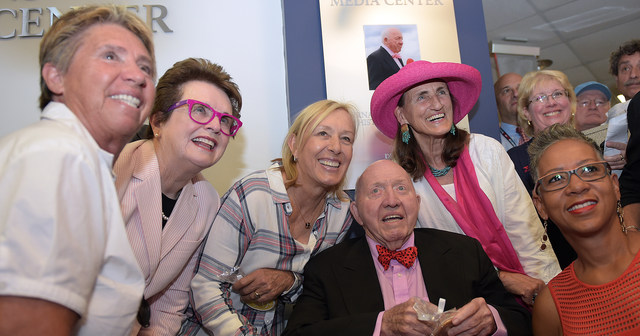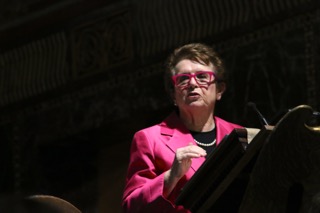|
No sport carries a sense of community like tennis. Even with gigantic prize money and swollen retinues of today, the sport remains somewhat a caravan of gypsies familiar to each other, even though their occupations vary – players, coaches, hitting partners, significant others, moms and dads, agents and publicists, plus the specialists who cover the sport: the peripatetic photographers plus the scribblers and babblers, as Bud Collins called himself and his colleagues.
Arthur Worth Collins, Jr., was the center of one sport, more than any other journalist has ever been. In his half century on the beat, tennis has been a movable feast, seeking warm spots year round – Monaco in April, Wimbledon in late June, Australia in January – jet-lagged regulars taking the rays during a desultory early-round match in some tune-up event. Collins could doze in the sun with the best of them, as recalled by Bill Littlefield of WBUR radio, who spoke at the memorial service for Collins in historic Trinity Church on Copley Square in Boston last Friday. Littlefield talked about Collins the writer – often overlooked amidst his garish pants and equally garish vocabulary – who could describe the sound of tennis balls being “punished,” yet make it a soft, pleasurable backdrop to life itself, like a heartbeat. Collins was the heart of the sport for decades, back to the late 60s when he shifted from a general sports reporter who recognized the special ones, Muhammad Ali and Bill Russell and Billie Jean King, becoming a tennis maven. He brought people together at events around the world, said Lesley Visser, once a Globe sports writer, now a broadcaster, who recalled how Collins could write a column and simultaneously answer questions from colleagues, always ending with some version of “ciao” in their native tongues. (He addressed me as “VAY-chay,” which is how real Hungarians pronounce my name. Three Italian insiders – Gianni Clerici, Ubaldo Scanagatta and Rino Tommasi – in turn called him “Collini.”) Collins, in failing health for years, passed on March 4 at 86, and his wife and protector and caretaker for two decades, Anita Ruthling Klaussen, spent three months preparing a ceremony -- on his birthday -- that was both elaborate and parochial in that most hamish of great American cities. The service was both stately Episcopalian and randy jock. In the pews were familiar faces, and forehands, of Rod Laver, Stan Smith, Todd Martin and Pam Shriver, as well as tennis officials from around the world, and journalists who knew Collins both as friend and source (oh, and by the way, a very accomplished "hacker" in the tennis sense of the word.) Two great champions spoke. Chris Evert recalled being a monosyllabic 16-year-old, feeling the kindness of Collins, and later, when she lost seven Wimbledon finals to a rival whose name she did not need to pronounce, Collins was always at courtside, doing a worldwide live interview “in those silly pants,” but with a kind smile that showed he understood the pain of being second on that day of days. Billie Jean King, wearing a pink blazer in tribute to the people who died in Orlando a week earlier, captured the day, for me, because she was once again Mother Freedom – nickname courtesy of Collins – and like Evert she remembered being interviewed by Collins at 16 and finding she could talk to him. King's talk was disciplined, smart and passionate. She remembered Ali once telling her that people had to always be ready for the moment. She found that trait in Collins, always in tune to the colors and tones and spins and bounces of that day, living in the moment, working hard, enjoying himself. The congregation was elderly, many people moving slower than they used to. Hundreds of them came from a world where everybody followed the sun, hearing the brassy notes from the Pied Piper who was at the core of their world for so long, and so well.
Dave
6/19/2016 03:26:47 pm
As a boy, I could sit and watch the major tournaments on television with my father, so long as I remained quiet. I knew of Collins from television. Only later did I read him in the Boston Globe and in tennis publications. As a middling tennis player, but also as a sportswriter in junior high and high school, I wanted to be a tennis writer, envying Collins' familiarity with the men and women whose court exploits I followed. Alas, as a journalist, I left sports for more conventional news. George, thank you for this piece on Collins' memorial.
George Vecsey
6/19/2016 10:18:19 pm
Dave, thanks for the note. Growing up with the Globe sports section must have been fun. I went from sports to news for a decade -- known in the business as "going straight." Ultimately, I was a recidivist but you kept on the straight and narrow. Best, GV
Davan S. Mani
6/24/2016 08:53:40 am
I heard a story where in a small tournament, Chris Evert refused to sign a fan's autograph. Bud instead signed it with her name.
George Vecsey
7/1/2016 01:57:49 pm
Great story., After all, clubhouse men have signed balls for Ruth, Mantle, et al, from time eternal.
bruce
7/6/2016 11:06:29 pm
George, 8/20/2016 02:28:13 am
I got a simple method to acquire online whatsapp hacker totally free of cost. 8/31/2016 04:21:58 pm
I'm really enjoying the template/theme of this site. It's simple, yet effective. Comments are closed.
|
Categories
All
|












